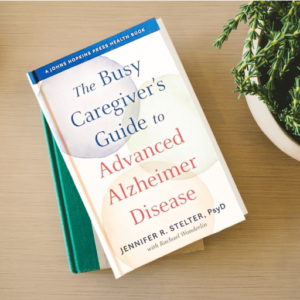A caregiver can be anyone who helps an individual with various tasks of daily living, transportation to and from health appointments, and assisting someone with financial decisions.
While the most common type of caregiver people think about are paid healthcare professionals, friends, family members, and spouses can also be caregivers.
Being a caregiver for your spouse with Alzheimer’s disease can feel like the most appropriate decision and the only one you can think of because who can take better care of your partner than you?
The problem is when you, acting as a caregiver, experience caregiver burnout. When a person experiences this caregiver burnout, they start to live in a state of physical and mental exhaustion. Caregiver burnout is critical to avoid because you may start to develop changes in your own health and perception of your relationship with your partner.
This article will help you develop better-coping strategies and provides tips for caring for a loved one with Alzheimer’s disease.
How to cope when your spouse has Alzheimer’s disease
When it comes to having a spouse or partner that has Alzheimer’s disease, it is normal to feel like if you stop to take time for yourself, you are being selfish. Remembering to take time for yourself is also critical because you can’t expect to properly assist anyone if you are not in a good mindset.
Often, when you are acting as a caregiver for someone else, your own health gets placed on the back burner. When you can’t stop for yourself, you may find that your health conditions worsen, and you are suddenly physically unable to care for your spouse.
Consider the following Alzheimer’s disease caregiver tips to help you prepare for being a caregiver as well as help to better care for yourself so that you can care for your spouse.
- Increase your physical activity. Find an activity that you will find enjoyable, such as walking or yoga. Start in little increments and gradually increase the amount of time and how many days you perform this activity. Physical activity will help relieve stress and comes packed with health benefits when done consistently.
- Take up other people’s offers to help. Accepting other people’s offer to help can be difficult because you might feel like you don’t want to burden them; however, they are probably asking because they want to help! If someone asks how they can help, assign them a task and relieve yourself of that burden.
- Connect with others. Find a community, either online or in-person, of others in similar situations to yours. Hearing others express frustrations you have as well can be a big reliever in knowing you are not alone.
- Implement techniques to encourage relaxation. Learning relaxation techniques is incredibly beneficial to help you deal with those times when frustration is high. Relaxation techniques use skills like visualization and meditation, for example.
- Empower yourself by staying knowledgeable about the disease. Remain current on all the latest information in the progression and treatment of Alzheimer’s disease. Follow your favorite organization on social media or join their mailing list to ensure you get the latest news.
- Remember to plan for the future. Planning includes not only your future but your spouse with Alzheimer’s future as well. It can be difficult to think about, though it’s essential to prepare for the chance of you not being around to care for your spouse. Think about who and how you would want care provided to your partner. Start and even keep planning for your financial future. Remember to budget for unexpected bills.
- Try to remain flexible. The person with Alzheimer’s disease needs will change over time. Sometimes a task they could do a couple of days ago has changed, and they can’t perform that same task. Remember to be fluid and not let frustration turn a situation into a bad one.
- Take a break. Prevent yourself from getting overwhelmed. Stop when you must, and remember it’s ok if your house isn’t perfectly clean. What’s important is that you stop to care for yourself as well.
Different stages of Alzheimer’s disease can affect you as a spouse differently. So knowing and understanding your role as a caregiver in these stages is helpful to anticipate the amount of help you will need to provide to your spouse and the kind of help you may need yourself.
Care during the early stages
In the early stages, most people can function independently, and your role should be that of support. Your spouse will need you to be there as a companion and to help them make decisions that involve their (and your) future.
During this time, you and your partner can start planning for the future financially. Consider the costs that may occur in treatment, from medications to therapies. You and your partner can discuss care measures that will happen later on as the disease progresses. Consider whether you and your partner can afford an in-home caretaker or if it is more financially reasonable to consider more of an assisted living type facility.
Care during the middle stages
You may notice more behavior changes beginning to occur during the middle stages of Alzheimer’s disease. The person with Alzheimer’s disease will start to have difficulties with activities of daily living like bathing and dressing during the middle stages.
Your spouse may need a more structured routine to help cope with these new changes. It’s also important to stay flexible during this time because you might need to change that routine as the disease progresses and your spouse’s needs increase.
During this time, you have to remember to take time for yourself. The caregiver role you are now in can be very demanding and a considerable change from before.
Caregiving during the late stages
When a person is in the late stages of Alzheimer’s disease, their need for care is often high. They might have problems with eating and need meals cut up for them or even a specialized diet.
The person going through the late stages of Alzheimer’s disease will often need extensive care. Your partner may need full-time care, meaning they might need to be in a facility with healthcare professionals responding to their needs around the clock.
Signs of caregiver stress
Being a caregiver can have its burdens, and knowing what caregiver stress might look like is helpful. When you are focusing on someone else’s needs, it’s common not to notice your own, and unfortunately, when you go long enough and do not realize you’ve reached your limits, your health can become affected.
When you start to notice any of the following, it may be a sign that you are experiencing caregiver stress:
- Difficulty concentrating
- Frequent moments of sadness
- The increased need for alcohol
- You start to get irritated easily and quickly
- Feeling tired even after a decent night’s sleep
- Gaining weight quickly or even losing weight rapidly
- Anger towards your spouse with Alzheimer’s disease
- You haven’t connected with friends and family recently
When you start to notice any signs that you are experiencing caregiver stress, then you should reach out for help. This is the time to talk with other family members and enlist them in some of the care for your partner.
Respite care is something to consider. Respite care is when the caregiver will take some time off from their responsibilities in being a caregiver. Services are often offered from care either in the home or adult day care and sometimes can be provided by short-term nursing home care when needed.
While caring for a spouse with Alzheimer’s disease can be stressful, it is important to know that you are not alone. Ask family and friends for help when you need it. Reach out to community programs and resources for help when you need it. Take care of yourself so that you can better care for your loved one.
Key Takeaways
- Caregivers can develop caregiver burnout and experience physical and mental exhaustion.
- It is important to ask for help when you start developing signs of caregiver stress so your health doesn’t suffer.
- Accept help from others when they offer it, and remember to take time out for yourself.
- During the early stages of Alzheimer’s disease, plan for the future with your spouse to make arrangements.
- Keep in mind that during the late stages of Alzheimer’s disease, the care needed by your spouse will be high and often around the clock.
Resources
Alzheimer’s Association. (n.d.). Early stage caregiving. https://www.alz.org/help-support/caregiving/stages-behaviors/early-stage
Eldercare Locator. (n.d.). Community Resource Finder. Administration for Community Living. https://www.communityresourcefinder.org/
MedlinePlus. (n.d.). Caregiver health. U.S. National Library of Medicine. https://medlineplus.gov/caregiverhealth.html
Mayo Clinic Staff. (2021, January 6). Caregiver stress: Tips for taking care of yourself. Mayo Clinic. https://www.mayoclinic.org/healthy-lifestyle/stress-management/in-depth/caregiver-stress/art-20044784








